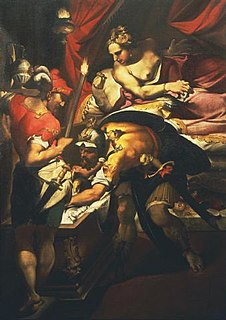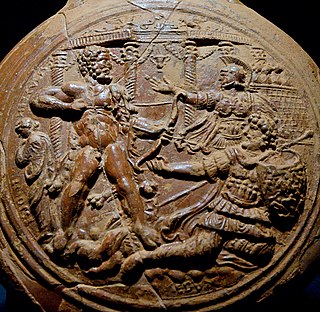
In Greek mythology, Chryses ( /ˈkraɪsiːz/ ; Greek : ΧρύσηςKhrúsēs) was a Trojan priest of Apollo at Chryse, near the city of Troy.

Greek mythology is the body of myths originally told by the ancient Greeks. These stories concern the origin and the nature of the world, the lives and activities of deities, heroes, and mythological creatures, and the origins and significance of the ancient Greeks' own cult and ritual practices. Modern scholars study the myths in an attempt to shed light on the religious and political institutions of ancient Greece and its civilization, and to gain understanding of the nature of myth-making itself.

Greek is an independent branch of the Indo-European family of languages, native to Greece, Cyprus and other parts of the Eastern Mediterranean and the Black Sea. It has the longest documented history of any living Indo-European language, spanning more than 3000 years of written records. Its writing system has been the Greek alphabet for the major part of its history; other systems, such as Linear B and the Cypriot syllabary, were used previously. The alphabet arose from the Phoenician script and was in turn the basis of the Latin, Cyrillic, Armenian, Coptic, Gothic, and many other writing systems.

Troy was a city in the far northwest of the region known in late Classical antiquity as Asia Minor, now known as Anatolia in modern Turkey, just south of the southwest mouth of the Dardanelles strait and northwest of Mount Ida. The present-day location is known as Hisarlik. It was the setting of the Trojan War described in the Greek Epic Cycle, in particular in the Iliad, one of the two epic poems attributed to Homer. Metrical evidence from the Iliad and the Odyssey suggests that the name Ἴλιον (Ilion) formerly began with a digamma: Ϝίλιον (Wilion); this is also supported by the Hittite name for what is thought to be the same city, Wilusa.
According to a tradition mentioned by Eustathius of Thessalonica, Chryses and Briseus (father of Briseis) were brothers, sons of a man named Ardys (otherwise unknown).

Eustathius of Thessalonica was a Byzantine Greek scholar and Archbishop of Thessalonica. He is most noted for his contemporary account of the sack of Thessalonica by the Normans in 1185, for his orations and for his commentaries on Homer, which incorporate many remarks by much earlier researchers.
In Greek mythology, Briseus or Brises is the father of Briseis (Hippodameia), a maiden captured by the Greeks during the Trojan War, as recorded in the Iliad. Eustathius of Thessalonica, a commentator on Homer, says Briseus and Chryses were brothers, as sons of Ardys, with Briseus dwelling in Pedasus, and Chryses residing in Chryse; both were towns in the Troad. Pedasus was said by Homer to be Lelegian settlement, ruled by the Lelegian king Altes. Thus, Briseus may also have been a Lelegian. Other sources say that Briseus was a priest of Lyrnessus. According to Dictys Cretensis, Briseus hanged himself when he lost his daughter.

Brisēís, also known as Hippodámeia, is a significant character in the Iliad. Her role as a status symbol is at the heart of the dispute between Achilles and Agamemnon that initiates the plot of Homer's epic. She was married to Mynes, King of Lyrnessus, until Achilles sacked her city and enslaved her shortly before the events of the poem.
During the Trojan War (prior to the actions described in Homer's Iliad ), Agamemnon took Chryses' daughter Chryseis (Astynome) from Moesia as a war prize and when Chryses attempted to ransom her, refused to return her. Chryses prayed to Apollo, and he, in order to defend the honor of his priest, sent a plague sweeping through the Greek armies, and Agamemnon was forced to give Chryseis back in order to end it. The significance of Agamemnon's actions lies not in his kidnapping Chryseis (such abductions were commonplace in ancient Greece), but in his refusal to release her upon her father's request. [1]

In Greek mythology, the Trojan War was waged against the city of Troy by the Achaeans (Greeks) after Paris of Troy took Helen from her husband Menelaus, king of Sparta. The war is one of the most important events in Greek mythology and has been narrated through many works of Greek literature, most notably Homer's Iliad. The core of the Iliad describes a period of four days and two nights in the tenth year of the decade-long siege of Troy; the Odyssey describes the journey home of Odysseus, one of the war's heroes. Other parts of the war are described in a cycle of epic poems, which have survived through fragments. Episodes from the war provided material for Greek tragedy and other works of Greek literature, and for Roman poets including Virgil and Ovid.

Homer is the legendary author of the Iliad and the Odyssey, two epic poems that are the central works of ancient Greek literature. The Iliad is set during the Trojan War, the ten-year siege of the city of Troy by a coalition of Greek kingdoms. It focuses on a quarrel between King Agamemnon and the warrior Achilles lasting a few weeks during the last year of the war. The Odyssey focuses on the journey home of Odysseus, king of Ithaca, around 20 years after the fall of Troy. Many accounts of Homer's life circulated in classical antiquity, the most widespread being that he was a blind bard from Ionia, a region of central coastal Anatolia in present-day Turkey. Modern scholars consider these accounts legendary.

The Iliad is an ancient Greek epic poem in dactylic hexameter, traditionally attributed to Homer. Set during the Trojan War, the ten-year siege of the city of Troy (Ilium) by a coalition of Greek states, it tells of the battles and events during the weeks of a quarrel between King Agamemnon and the warrior Achilles.
Chryses, with help from Orestes, was also responsible for the death of Thoas. He killed Thoas after finding out that the son of Chryseis, called "younger Chryses", was also the son of Agamemnon. After he killed Thoas, Chryses went to Mycenae. [2]

In Greek mythology, Orestes was the son of Clytemnestra and Agamemnon. He is the subject of several Ancient Greek plays and of various myths connected with his madness and purification, which retain obscure threads of much older ones.
Thoas, son of Andraemon and Gorge, was one of the heroes who fought for the Greeks in the Trojan War.

In Greek mythology, Chryseis is a Trojan woman, the daughter of Chryses. Chryseis, her apparent name in the Iliad, means simply "Chryses' daughter"; later writers give her real name as Astynome (Ἀστυνόμη). The poet Tzetzes describes her to be "very young and thin, with milky skin; had blond hair and small breasts; nineteen years old and still a virgin".





